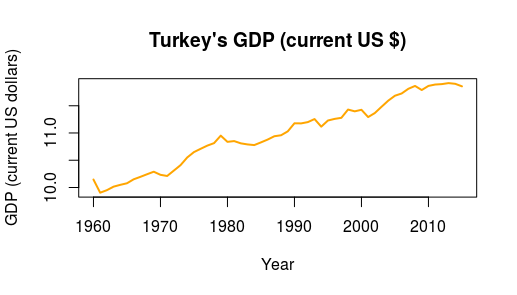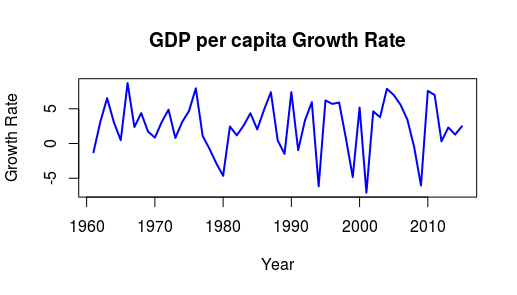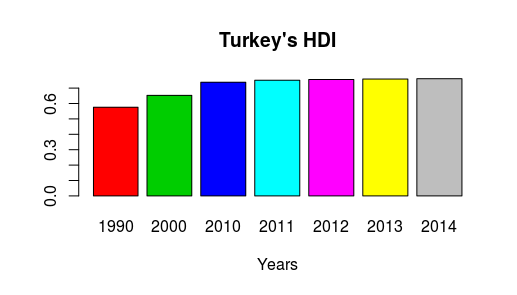The ruling Justice and Development Party (AKP) has maintained its popular support since coming to power in 2002. The government and the circles associated with it claim that the AKP governments have performed much better than previous governments, pointing out enrichment of masses, its mega projects and never-seen-before privatization schemes that it undertook rather zealously. Arguing for an unprecedented economic success in the history of the Republic, they proudly point out the unwavering electoral support they have been receiving in most local and national elections. In the framework of authoritarian, increasingly repressive and blatantly extra-legal practices of the government, one consequently feels it necessary to go beyond aggregate statistics and see if their high-fluted discourse is justifiable.
When comparing economies or speaking of change in the size of an economy it is conventional to refer to aggregate measures such as Gross National Product (GNP) or Gross Domestic Product (GDP). However, we know that these are simply average figures that conceal a lot more than they reveal. For a crude comparison among economies, or to get a rough idea about how a particular country is doing in the world economy, these figures have some practical utility but beyond that they are almost useless. Even in per capita terms such statistics are not very informative. Therefore, alternative measures have been created to overcome the limitations of the conventional measures of economic growth. The Purchasing Power Parity, for instance, is one of them. Additionally, measures of poverty and inequality have been created in recent decades to understand social and economic phenomena better. Moreover, the Human Development Index (HDI) of the United Nations is an attempt to measure the level of development, a composite measure that consists of a number of basic indicators, reflecting development, rather than simply growth.

Using the conventional measures of economic growth, it can be seen that Turkey’s Gross Domestic Product, according to the World Bank, rose from 13,995,067,817.5092 in 1961 to 718,221,078,308.824 current US dollars in 2015. The increase is an impressive 5032 percent. The same figure for 1961-2001 was 1301 %, for 2002-2015 208.86 percent. GDP per capita, on the other hand, rose from $508 in 1960 to $9130 in 2015.

Between 1961 and 2015 the annual rate of increase in per capita GDP, including all the ups and downs in the 54-year period, was 2.53 percent on average, which can only be considered a modest rate of growth. The per capita rate of increase in GDP in the 2002-2015 period turned out to be 3.33 percent on average, which is somewhat higher than the average for the pre-AKP period but is not all that impressive. What makes the GDP growth rate during the AKP period “shine” is perhaps the meager growth of 1.777 percent in the immediately preceding 10-year period during which an economic crisis wreaked havoc in Turkish economy.
However, as indicated above, the aggregate measures are never adequate; they conceal crucial facts such as income differentials or poverty rates. Therefore, we will have to look at the picture from the perspective of social justice and equity, criteria that should be of prime concern for the party in government.
The Gini coefficient, a measure of inequality, was 39.3 in 2013 (OECD), indicating a high degree of income inequality. In fact, Turkey has one of the highest levels of inequality in the OECD area. Similarly, the poverty ratio was 17.2 % for the same year. Income shared by the top 10 % of the population between 2002-2013 was on average 30.54 % with minor fluctuations over the period. On the other hand, the income share of the lowest 20 % in the same period was on average 5.67 percent. As one can realize, these indicators manifest a high degree of inequality and poverty, that is not captured by the aggregate measures of economic growth. An unemployment of 10.7 % in July 2016 as announced by the Statistics Office of Turkey testifies to the mere fact that poverty and inequality are not negligible. In the 15-24 year age group unemployment is 19.8 %, indicating that a major portion of the jobless is among the youth, which happens to be one of the largest demographic groups in the country (median age being 30, half of the population is 30 years old and younger).
Considering the regional disparities in incomes and development, and the fact that 66.5 % of the population having non-mortgage debt, the policies of the AKP government can hardly be considered a success. Chronically low rates of savings, inadequate flow of foreign investment (unfortunately seen as panacea for low rates of savings in liberal economics), and moreover, the flight of capital due to recent political instability, terrorism and wars, not to mention the exceptional ineptitude of the policy-makers, the economy is on the brink of collapse, despite feeble efforts of government officials to calm public anxiety. It has to be pointed out that the economic growth the government is so proud to emphasize has been due to services and the construction sector, not to industrial production. The manufacturing sector was able to maintain itself through borrowing excessively and producing mostly for the domestic market. Even exports are based on importation of goods to a large extent, indicating serious structural problems with the economy. With a long-term debt in excess of $200 billion, the private sector is in dire straits. With a dwindling economy, the government is hard-pressed to increase its tax revenue not only for regular expenditures but also for financing the military operations in the east of the country and in Syria. With the national currency rapidly eroding against the US dollar and the panic on the part of the government pathetically calling for “de-dollarization” of the economy, the picture is quite bleak and the collapse seems imminent (ironically, most of the savings in foreign currency are located in provinces that have overwhelmingly voted for the conservative/nationalistic AKP, recently calling for reversion to the “national” currency and gold).

According to the UNDP, Turkey’s Human Development Index increased by 1.26 % in the 1990-2000 period. During the ensuing 10-year period, which corresponds to AKP rule, the figure was 1.23. That simply indicates that the AKP-period’s economic growth did not translate into any more development than the previous period. In fact, it was slightly lower. During the 2010-14 period Turkey registered an HDI growth rate of 0.79, resulting in an average growth of HDI of 1.17 percent for the 1990-2014 period. According to the 2014 figures, Turkey is in 72nd place in the community of nations. This clearly is not concomitant with its economic size, which the bureaucrats and politicians are often proud to point out for being among the top 20 economies in the world. Compared to countries with even a lower per capita income, such as Serbia, Cuba and Costa Rica, just to name a few, Turkey’s overall development is incompatible with its income level or with the size of its economy.
The conclusion we can draw from all this is that economic growth in Turkey has not resulted in the kind of economic development one would expect. The governments in recent history have not been successful in creating the necessary conditions for a structural transformation of the economy, and the AKP governments of recent years have not been any more successful than the preceding ones.